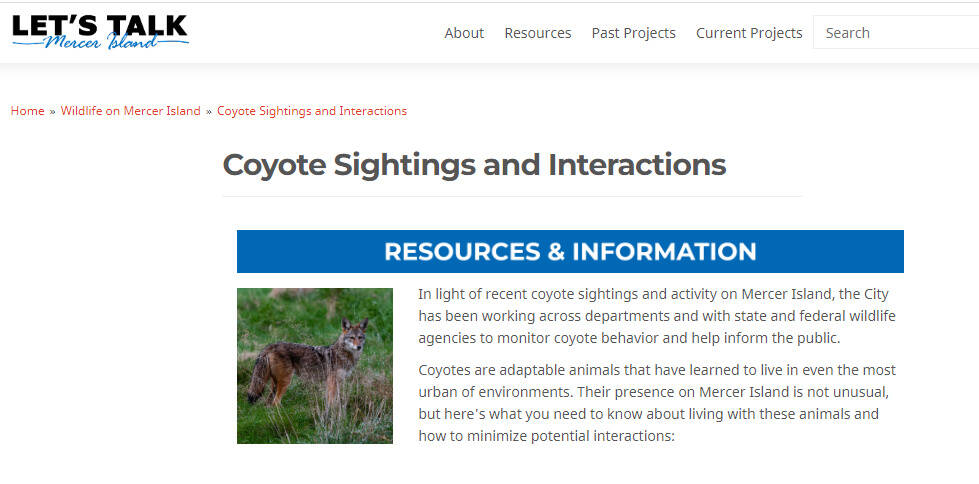Seven concerned residents passionately spoke about their experiences and feelings regarding coyote activity in the area at the Mercer Island City Council virtual meeting on Feb. 1.
One Islander reported that two coyotes mauled her dog, which surgeons later saved; another resident said she was stalked by two adult coyotes while walking her dog; several commentors said they felt unsafe with coyotes present on the Island; and two people stated that the coyotes should be eliminated from the Island.
During City Manager Jessi Bon’s discussion with council about the city’s development of a draft Coyote Management Plan, she noted with transparency that the United States Department of Agriculture (USDA) wildlife experts she’s spoken with advised that coyote behavior on the Island has reached the point of necessary removal of the animals. Since Washington state doesn’t allow coyote relocation, they would have to be euthanized, Bon added.
Bon had a meeting planned with USDA wildlife experts for Feb. 2 to discuss further steps to be taken. In November of 2021, USDA coyote expert Matt Stevens said in a virtual community meeting that according to his analysis of Island coyote activity, there were two to four coyotes roaming the area and he determined there to be zero threat to human health and safety. Bon said the USDA informed her that the coyotes probably entered the Island over the Interstate 90 bridge.
“We have been working with the USDA and using their guidelines. However, in my observation, they fell short because they don’t speak to all of the other things that we should be doing when we’re managing the presence of coyotes on the Island. So that led to the development of our own Coyote Management Plan,” Bon said.
Following the robust discussion with Bon and councilmembers, the council unanimously voted to adopt the draft plan. This follows the city’s recent launching of a centralized resource page to guide the public on how it can help minimize interactions with coyotes and other wildlife on the Island.
Bon said city staffers, including Mercer Island Police Department Operations Commander Mike Seifert, and a couple of attorneys have done extensive research and eyed similar plans in the Pacific Northwest and along the west coast to draft the Island document.
The draft plan notes that residents should never intentionally feed a coyote, don’t feed raccoons or other wildlife, avoid feeding pets outside, don’t compost meat or dairy, keep trash well-secured in containers, don’t leave pets unattended outside, remove water bowls for pets from outside and put away all watering cans and more.
The city’s strategy for managing coyotes includes: public education designed around coexistence with coyotes; and ensuring public safety by implementing appropriate tiered responses to coyote and human interactions. Residents can report incidents to police at its non-emergency number of 425-577-5656 or call 911 if they are in immediate danger.
The USDA’s trapping and removal of the coyotes — which hadn’t yet been approved at post time — could take a while, Bon said, and police Chief Ed Holmes said the cost would amount to $50 an hour. City Attorney Bio Park added that the agreement requires an initial deposit of about $2,700.
City councilmember Wendy Weiker thanked Bon for exhibiting bravery in initiating the coyote conversation. Public safety is paramount for councilmember Lisa Anderl, who said it’s a tough call for her whether to remove the animals — since she feels they could coexist with Islanders — and the city has received emails from residents against removal. According to the USDA, another coyote can make its way to the Island if one is removed, Bon said.
In the latest update on the situation, the city Let’s Talk page noted on Feb. 2: “The USDA’s urban coyote expert is reengaged with the city in response to recent reports to Mercer Island police indicating changes in the animals’ behavior. USDA staff will be operating on the Island to determine what action is appropriate — you may spot staff and USDA vehicles in various areas of the Island.”
For more information, visit https://letstalk.mercergov.org/wildlife-on-mercer-island.



